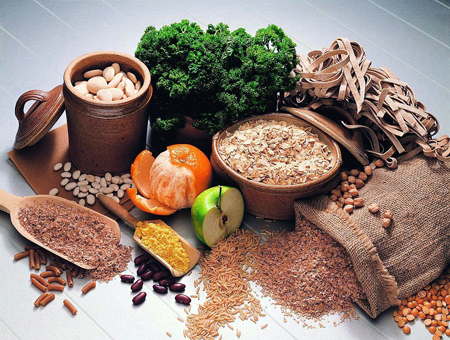1. Differentiating syndrome to decide the diet
Different diets are selected for different syndromes. For example, in the case of the exterior syndrome of affection by exogenous wind and cold with the manifestations such as headache, nasal obstruction, aversion to cold, general pain, anhidrosis, warm and hot-natured food such as Shengjiang (Rhizoma Zingiberis Recens), Congbai (Bulbus Allii Fistulosi) and brown sugar should be selected and decocted for oral administration. Take it while the decoction is warm. Or minced garlic shredded with warm noodles, soup of coriander and soybean may be ingested to induce diaphoresis, relieve the exterior syndrome and expel cold. More information about Chinese medicine, please read Causes of Ovarian Cyst in TCM.
In the case of renal yang deficiency with the symptoms such as lassitude in loins and legs, cold limbs, aversion to cold, cramping sensation of the lower abdomen, frequent or unsmooth urination, diets of supplementing fire to remove yin should be selected such as dog meat, sparrow meat and mutton, or renal soup of a white sheep and chicken cooked with Dongchongxiacao (Cordyceps).

2. Differentiating disease to decide the diet
Different diets also should be selected according to the differences of diseases on the basis of differentiating syndrome to decide the diet. For instance, in the case of palpitation, Danggui (Radix Angelicae Sinensis) and Renshen (Radix Ginseng) may be selected to be cooked with the pork heart; in the case of night blindness, various animal livers may be decocted with Gouqizi (Fructus Lycii), Sangshenzi (Semen Mori), etc. for oral administration; the pork lung fried with sesame oil or soup of the pork lung may be used for cough due to pulmonary asthenia; bone marrow and cerebral marrow powder of the pig or gruel of Taoren (Semen Persicae) may be selected for senile dementia; the pig pancreas may be selected for diabetes mellitus; more milk, etc. may be drunken for osteoporosis. More information about Chinese medicine, please read Symptoms of Ovarian Cyst in TCM.
3. Scientific selection of diets
The scientific use of diets can be defined by the proverb "The diet should include coarse and fine food grains without being too sweet and salty. People should have three, or four or five meals a day with being 70 to 80 percent full." The first sentence refers to the advocation of a proper proportion between coarse and fine food grains in TCM life cultivation. Coarse food grains include maize, soybean, sweet potato and the like; fine food grains, non-glutinous rice, flour and so on. In the second sentence, "three, or four or five meals" means the times people should have meals a day; "70 to 80 percent full" is the experience of becoming longevous which has been proven by history. More information about Chinese medicine, please read TCM Diagnosis for Ovarian Cyst.
The dietary style of being "70 to 80 percent full" has proven to be the effective method of promoting longevity by the public at all times and in all countries. This is similar to the modern theory of "low caloric diet". There are two methods to measure the so-called "70 to 80 percent full", one is that people feel a little hungry and still want to eat when leaving the dinning table; the other is that people have the sense of hunger when it is not the time for the next meal yet. There exists a saying in TCM life cultivation. "If you want to be healthy, you should always feel 30 percent cold and hungry." This has already be verified by numerous longevous people. More information about Chinese medicine, please read Chinese medicine Treatment for Ovarian Cyst.







